Jump To Section
Hormonal acne is a prevalent skin concern that affects people across all age groups. While it’s often associated with teenagers and puberty, hormonal acne can also significantly impact adults, particularly women. Hormonal fluctuations, whether due to puberty, pregnancy, or menopause, can trigger acne breakouts. This blog aims to provide a detailed look into what hormonal acne is, the causes behind it, its symptoms, and the most effective treatments to manage it.
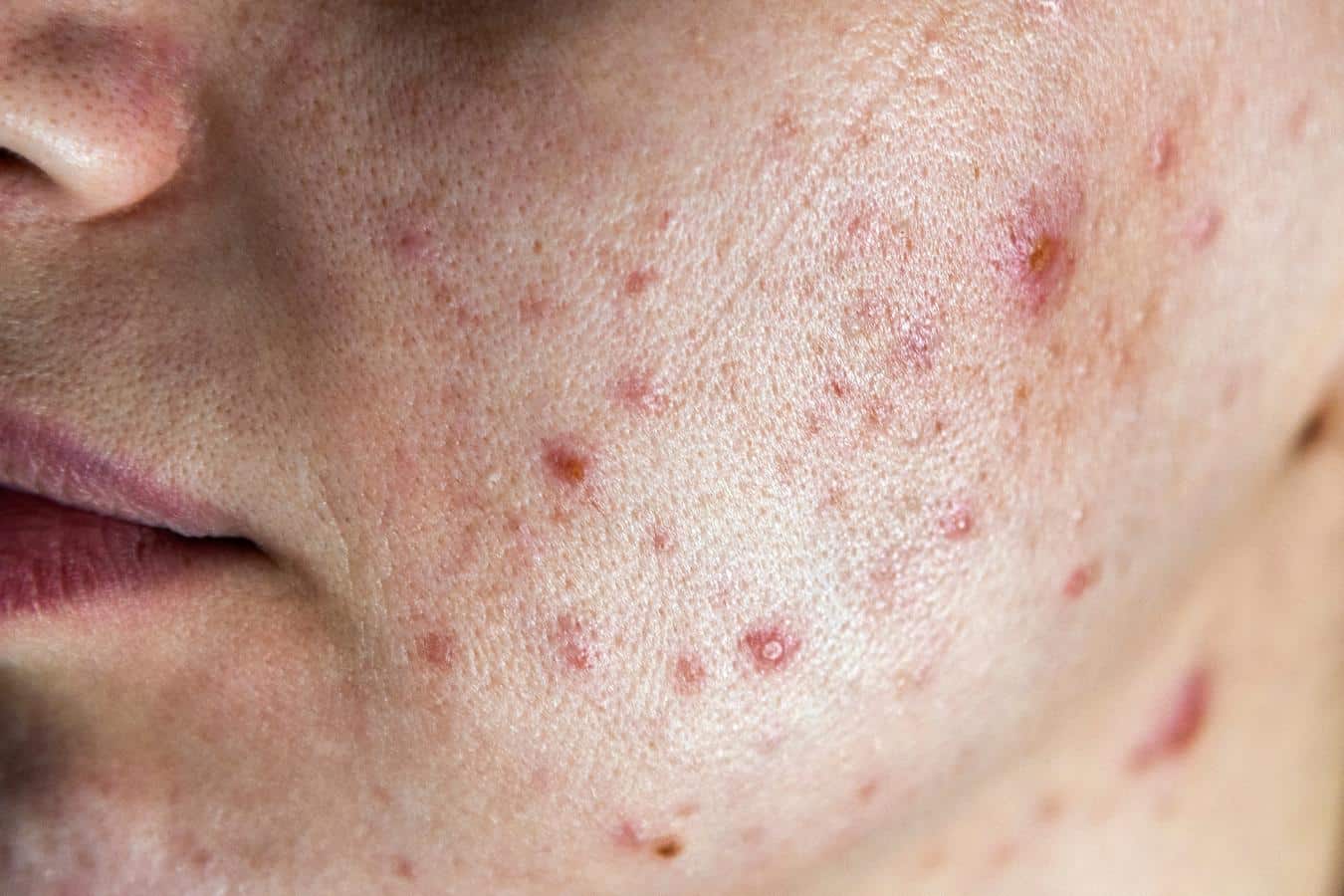
What is Hormonal Acne?
Hormonal acne, as the name suggests, is acne that is primarily influenced by hormonal changes in the body. While acne can occur at any age, hormonal acne tends to be more common during certain stages of life, such as puberty, pregnancy, and menopause. These hormonal fluctuations can result in excess oil production, clogged pores, and the development of acne. Though hormonal acne is often associated with teenagers, it can affect adults—especially women—due to hormone imbalances that occur during menstrual cycles, pregnancy, and menopause.

Puberty, Pregnancy, and Menopause
Puberty: During puberty, the body undergoes significant hormonal changes that can trigger acne. As the body produces more androgens (male hormones), these hormones stimulate the sebaceous glands to produce excess oil, which leads to clogged pores and acne. This is when many people experience their first bouts of acne.
Click here to learn more about teenage acne.

Pregnancy: Hormonal fluctuations during pregnancy, particularly during the first and second trimesters, can also lead to acne. Higher levels of progesterone and other hormones can increase sebum production and create a breeding ground for acne.
While some people believe that pregnancy always results in clearer skin, the reality is that many individuals experience more intense breakouts during this time. To learn more about common myths and misconceptions surrounding acne, click here to read our blog.

Menopause: Menopause leads to a drop in estrogen levels, which is commonly associated with a rise in androgens (male hormones), resulting in increased oil production and the potential for acne. This type of acne tends to occur around the chin and jawline, often resembling adult acne rather than teenage acne.
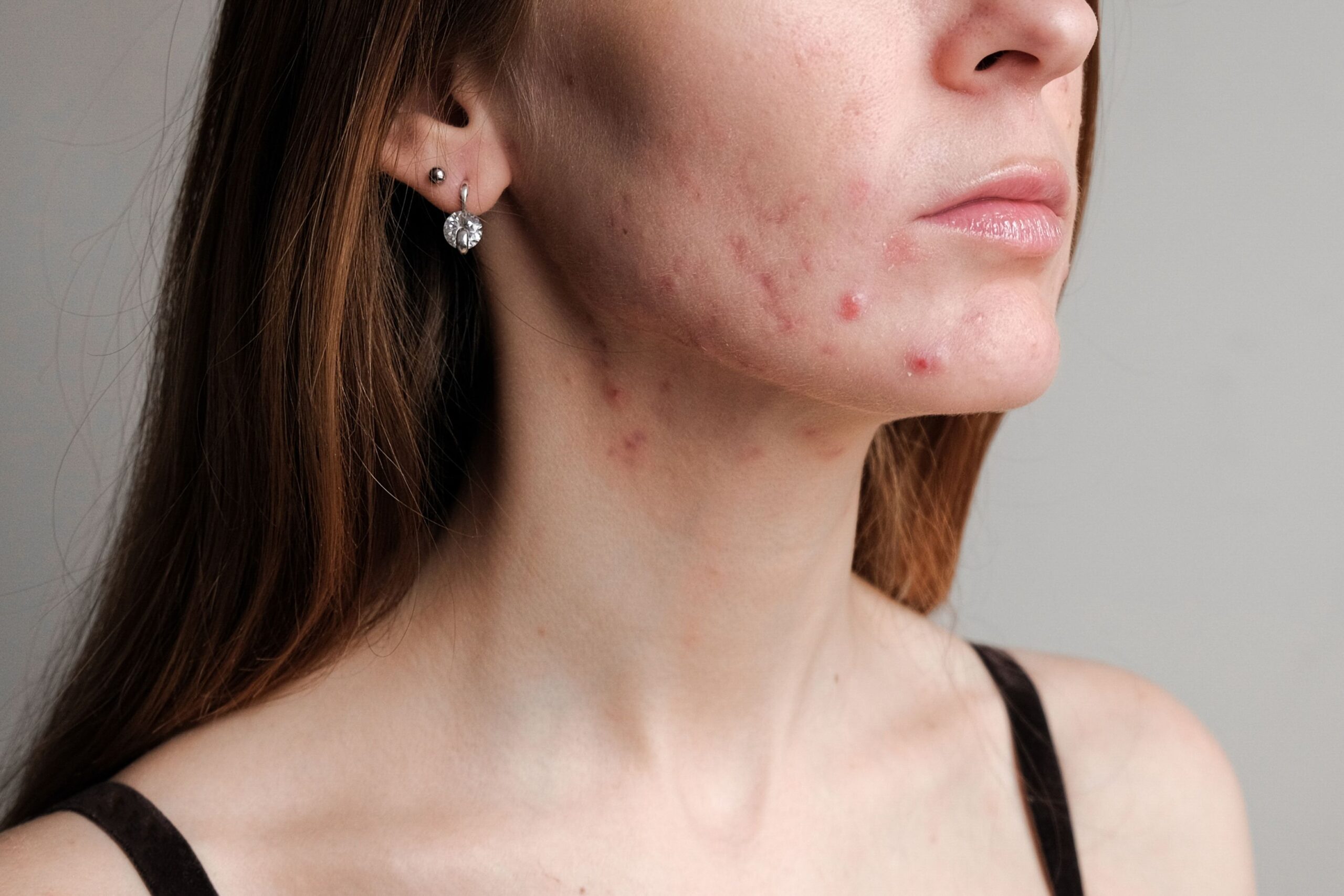
Click here to learn more about adult acne.
The Hormones Behind Acne
Hormonal acne occurs as a result of hormonal fluctuations that affect oil production in the skin. Let’s break down the hormones involved:
Androgens
Androgens are male hormones that are present in both men and women, although women typically have lower levels. These hormones stimulate the sebaceous (oil) glands in the skin. When androgens increase, such as during puberty, menstruation, pregnancy, or menopause, the sebaceous glands produce more oil. Excess oil can clog pores, leading to acne. This is the primary cause of hormonal acne.

Oestrogen & Progesterone
In women, estrogen and progesterone levels fluctuate throughout the menstrual cycle, and these fluctuations can influence acne development. During the second half of the menstrual cycle, when progesterone levels rise, oil production is stimulated, and acne may worsen. Estrogen helps to balance this oil production, but when estrogen levels dip (such as in menopause or during the luteal phase of the menstrual cycle), this balance is disrupted, and acne can develop.
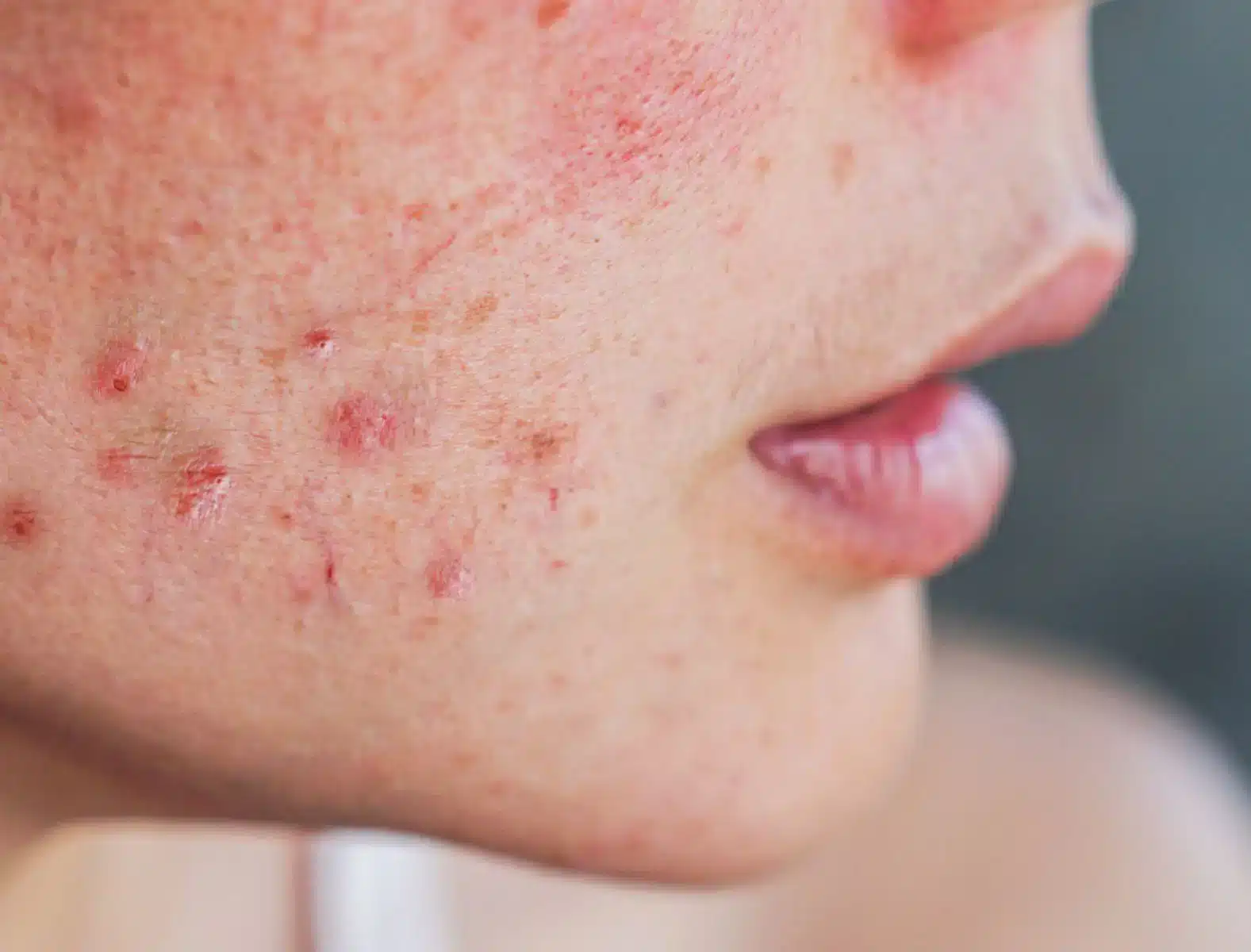
Stress Hormones (Cortisol)
Stress can also exacerbate hormonal acne. When you’re stressed, your body produces cortisol, a hormone that can trigger oil production in the skin. Elevated cortisol levels can therefore lead to increased sebum production, clogged pores, and acne flare-ups. Stress-related acne often appears around the lower part of the face, including the jawline and chin.

Symptoms of Hormonal Acne
Hormonal acne is typically characterised by specific symptoms and breakouts that are often deep, painful, and persistent. Common signs of hormonal acne include:
- Location of Breakouts: Hormonal acne often appears on the lower part of the face, including the bottom of the cheeks, chin, and jawline. These areas are most sensitive to hormonal fluctuations, and breakouts are often concentrated here.
- Deep, Painful Lesions: Hormonal acne tends to involve deeper cystic pimples, which can be painful to the touch. These pimples may not always come to a head and may take longer to heal compared to regular acne.
- Persistent Breakouts: Unlike regular acne, which may come and go, hormonal acne tends to be more persistent. You may notice breakouts that occur cyclically (e.g., before or during your period) or even consistently throughout the month.
- Inflammation and Redness: Inflammatory acne is common with hormonal acne, causing redness and swelling around the affected areas.
Common Triggers for Hormonal Acne
Hormonal acne tends to be triggered or worsened by the following factors:
- Menstrual Cycle: Many women experience breakouts before or during their menstrual period due to the rise in progesterone and a decrease in estrogen.
- Pregnancy: As mentioned earlier, pregnancy-related hormonal shifts can lead to acne flare-ups, particularly in the first trimester.
- Stress: Increased cortisol levels caused by stress can lead to the production of excess oil, triggering acne breakouts. Click here to learn more about how to manage stress for acne.
- Polycystic Ovary Syndrome (PCOS): A common condition that affects women, PCOS causes an imbalance in sex hormones, often leading to acne, particularly along the jawline and chin.
Targeted Treatments for Hormonal Acne
Managing hormonal acne requires a comprehensive approach. Several treatments, both topical and systemic, can help regulate hormones and reduce acne flare-ups. Below are some of the most effective treatments available:
1. Birth Control Pills
For women, birth control pills can be an effective way to regulate hormones and reduce acne. Oral contraceptives containing both estrogen and progestin can balance hormone levels, lowering the production of excess oil. However, not all birth control pills are created equal—some formulations can actually make acne worse. It’s essential to consult with a doctor to find the best option for your skin.
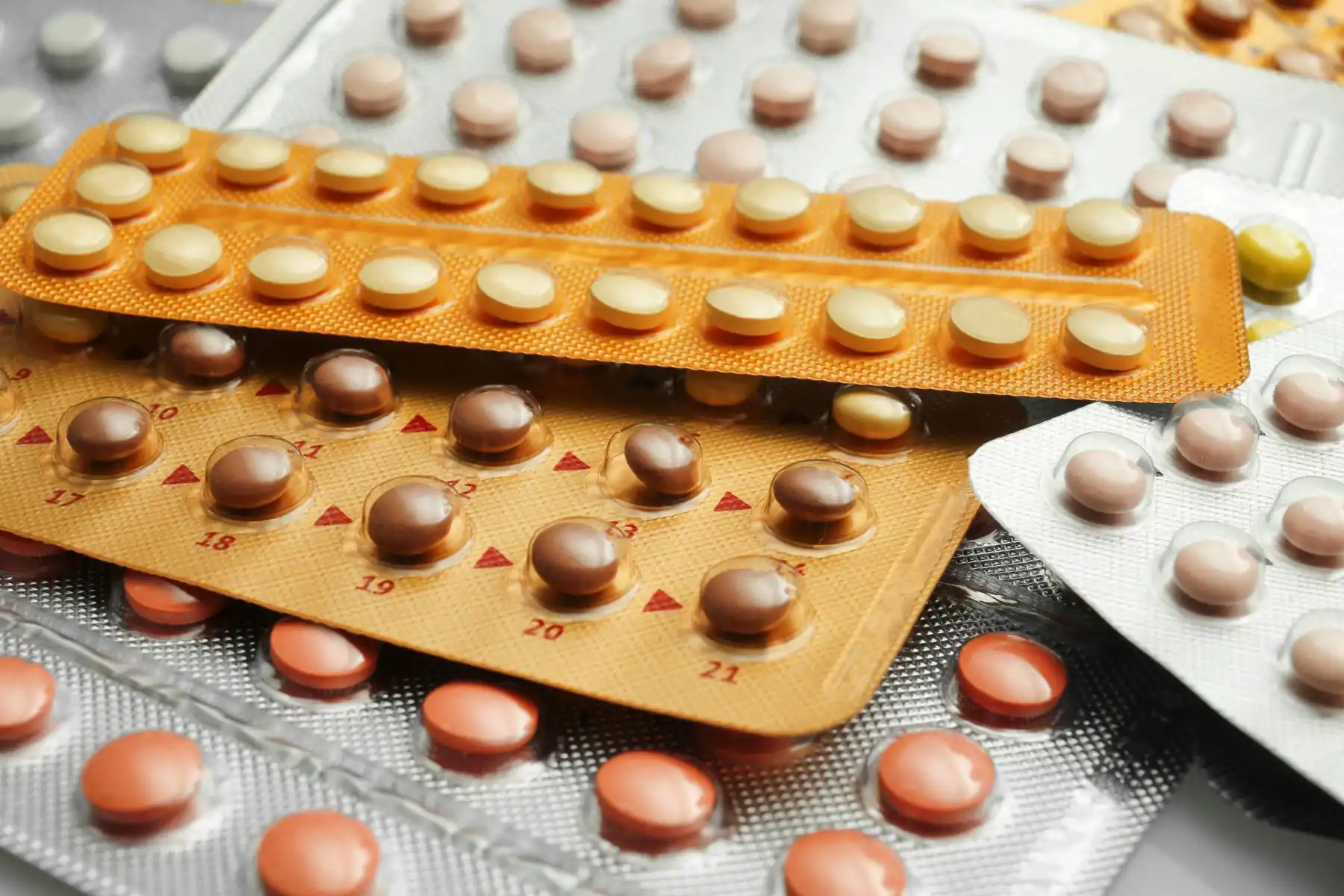
2. Anti-Androgens (Spironolactone)
Spironolactone is a medication that blocks androgens (male hormones) and is often prescribed for women who experience hormonal acne. By reducing the effect of androgens, spironolactone can help reduce oil production and improve acne. However, it should only be taken under the guidance of a healthcare provider, as it may not be suitable for everyone.

3. Topical Retinoids
Topical retinoids, such as tretinoin and adapalene, are effective treatments for acne. These retinoids work by promoting cell turnover, which helps prevent clogged pores. They also have anti-inflammatory properties that can help reduce the appearance of acne. Retinoids can be used in conjunction with other treatments to target acne and reduce scarring.
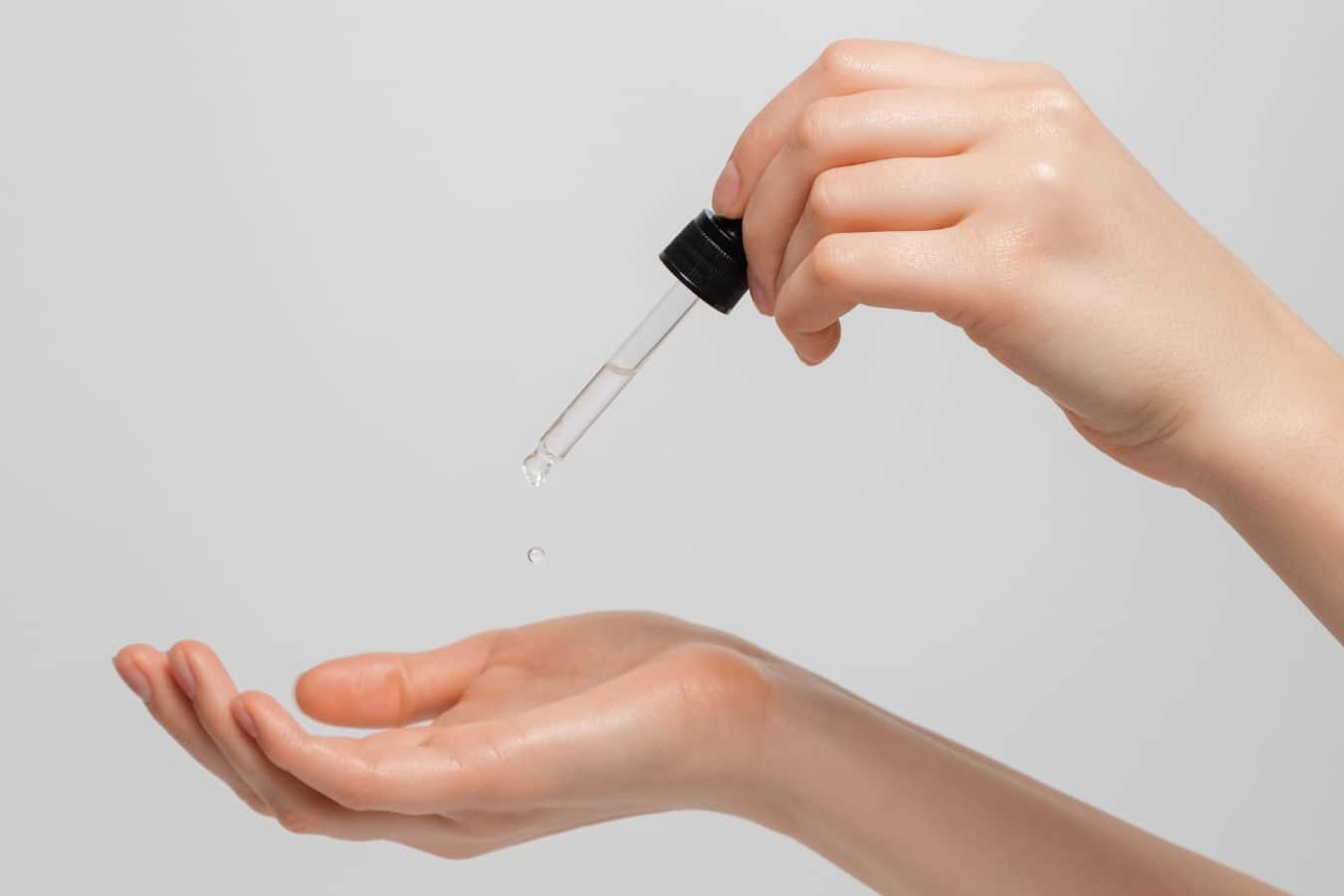
4. Oral Antibiotics
Oral antibiotics, such as tetracycline, doxycycline, and minocycline, can help control the bacteria on the skin and reduce inflammation. While they are effective in treating acne, antibiotics should be used for limited periods to avoid resistance. A dermatologist will advise on the appropriate length of treatment.
Click here to learn more about over-the-counter vs prescription products.
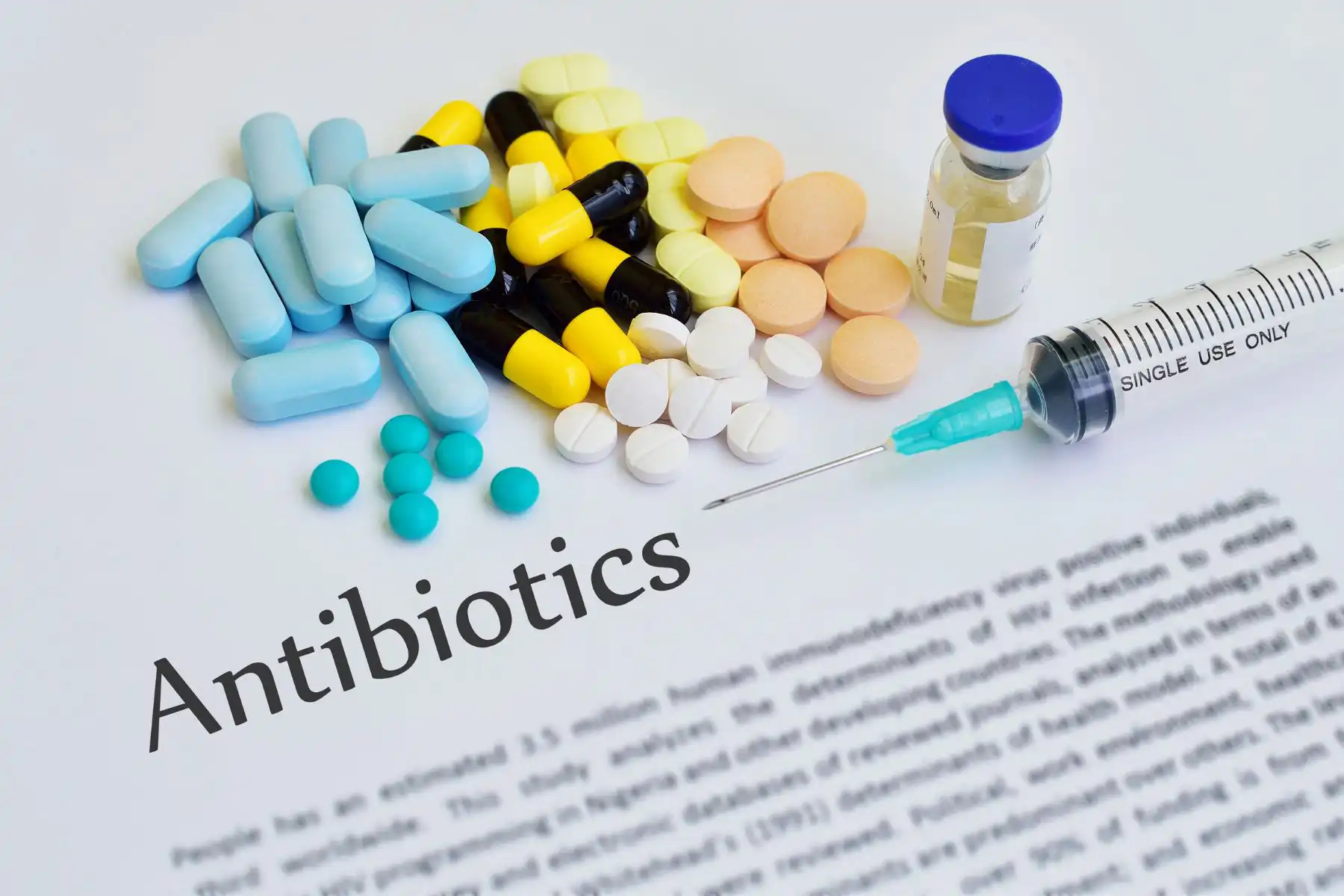
5. Stress Management
Since stress contributes to acne through increased cortisol levels, managing stress is essential for those with hormonal acne. Relaxation techniques such as yoga, meditation, exercise, and breathing exercises can help reduce cortisol production and improve skin health. Regular exercise also helps balance hormones and improve overall well-being.
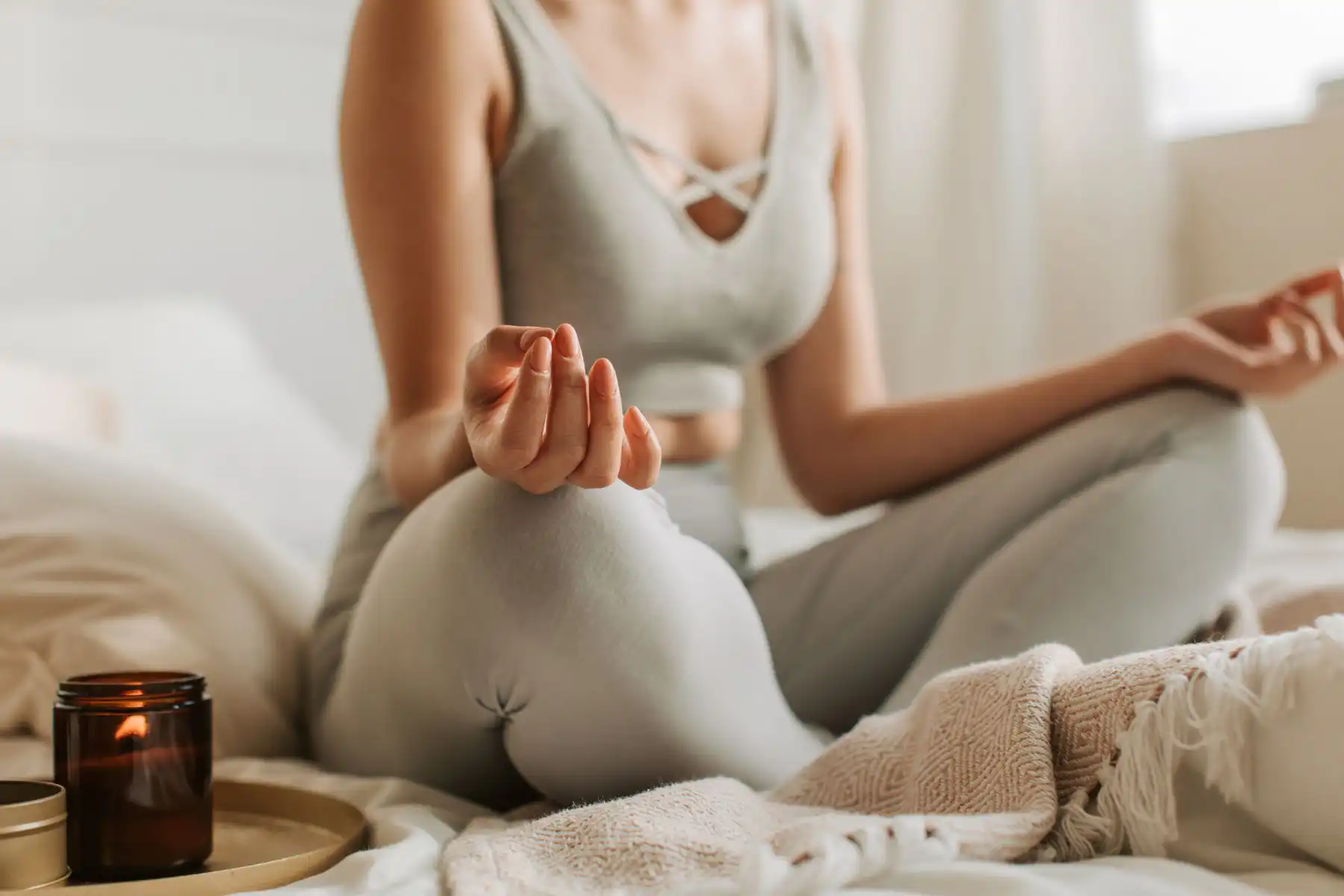
6. Lifestyle Changes
Alongside medication and skincare treatments, making lifestyle changes can help reduce the occurrence of hormonal acne:
- Maintain a Balanced Diet: A diet rich in antioxidants, low-glycemic foods, and healthy fats can support skin health. Avoid excessive sugar and dairy, as these may exacerbate acne.
- Regular Exercise: Exercise helps balance hormones and reduces stress, both of which are beneficial for managing hormonal acne.
- Proper Skincare Routine: Cleansing your skin regularly with gentle, non-comedogenic products and using acne-specific treatments can help control breakouts.
Click here to learn more about what ingredients matter most in acne products.
Or click here to learn more about our recommended acne products here at Freyja Medical.

7. Advanced Treatments
At Freyja Medical, we offer a range of advanced treatments designed to effectively target both active acne and the marks it can leave behind. For ongoing breakouts, our acne treatment packages may include a combination of medical-grade skincare, prescription medication, and in-clinic treatments such as HydraFacials, skin peels and LED light therapy – each tailored to your skin type and acne severity. Click here to learn more about our acne treatment packages.
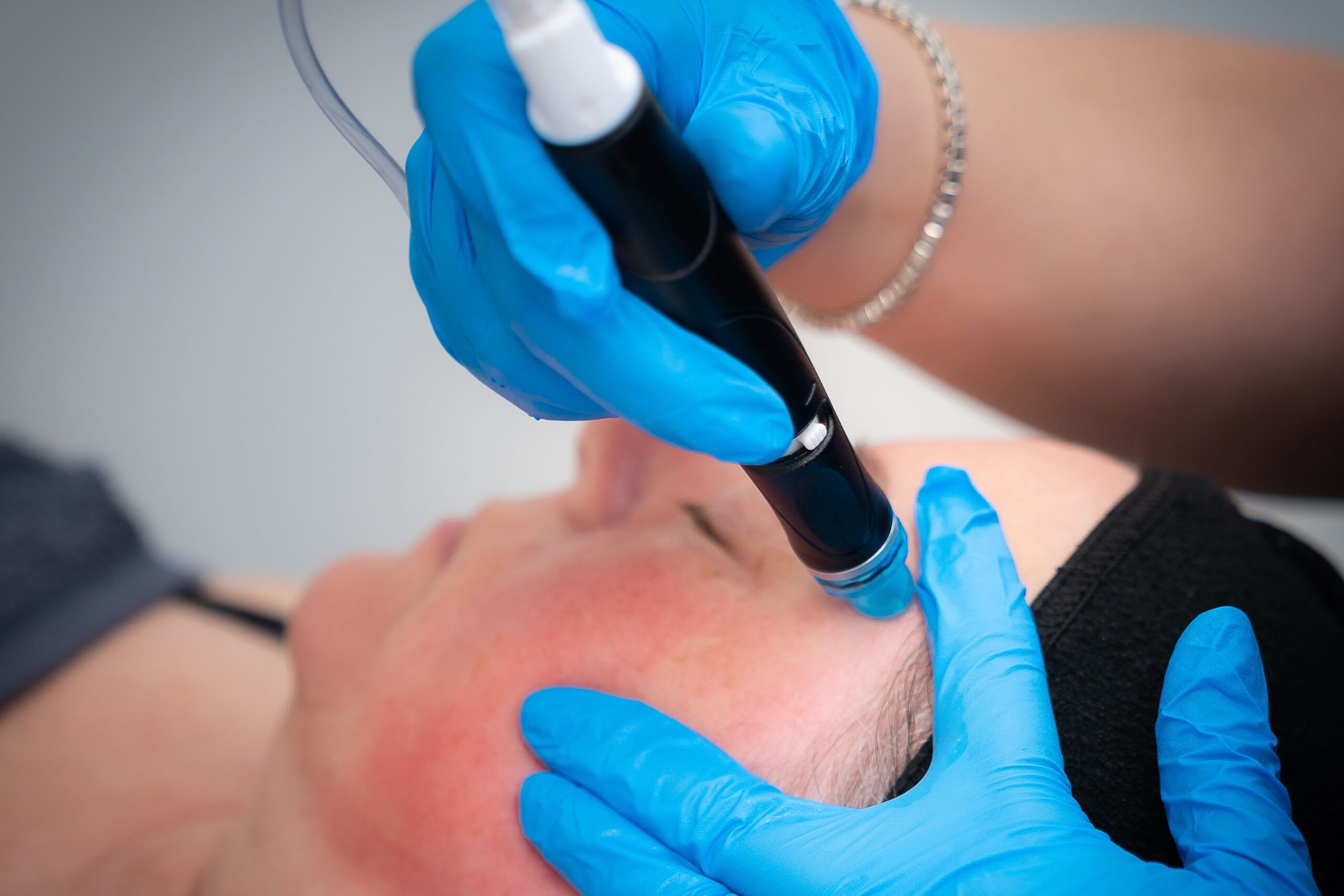
For those dealing with post-acne scarring, we also offer a dedicated acne scar treatment package, including microneedling and skin peels, to improve skin texture and tone over time. Every treatment plan is led by our expert team, ensuring your acne is managed with a personalised and medically sound approach. Click here to learn more about our acne scar treatment package.
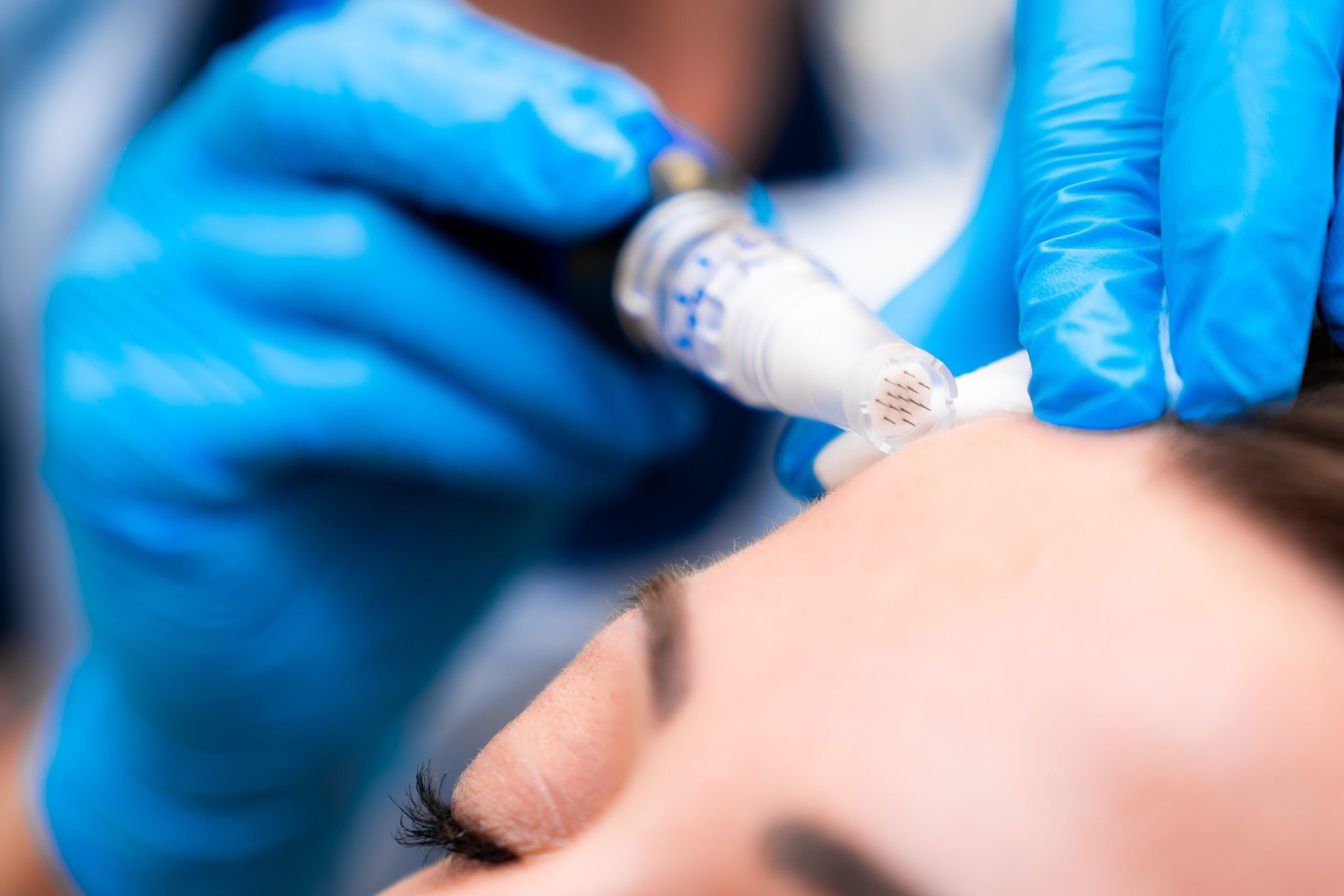
How to Book a Consultation
Hormonal acne can be persistent, but with the right treatments and expert guidance, it is manageable. At Freyja Medical, our dermatologists can assess your skin and create an individualised plan — often combining therapies — to achieve the best long-term results.
- For mild acne: A skincare consultation can help develop a personalised routine.
- For severe or persistent acne: A dermatology consultation is recommended for a tailored treatment plan.
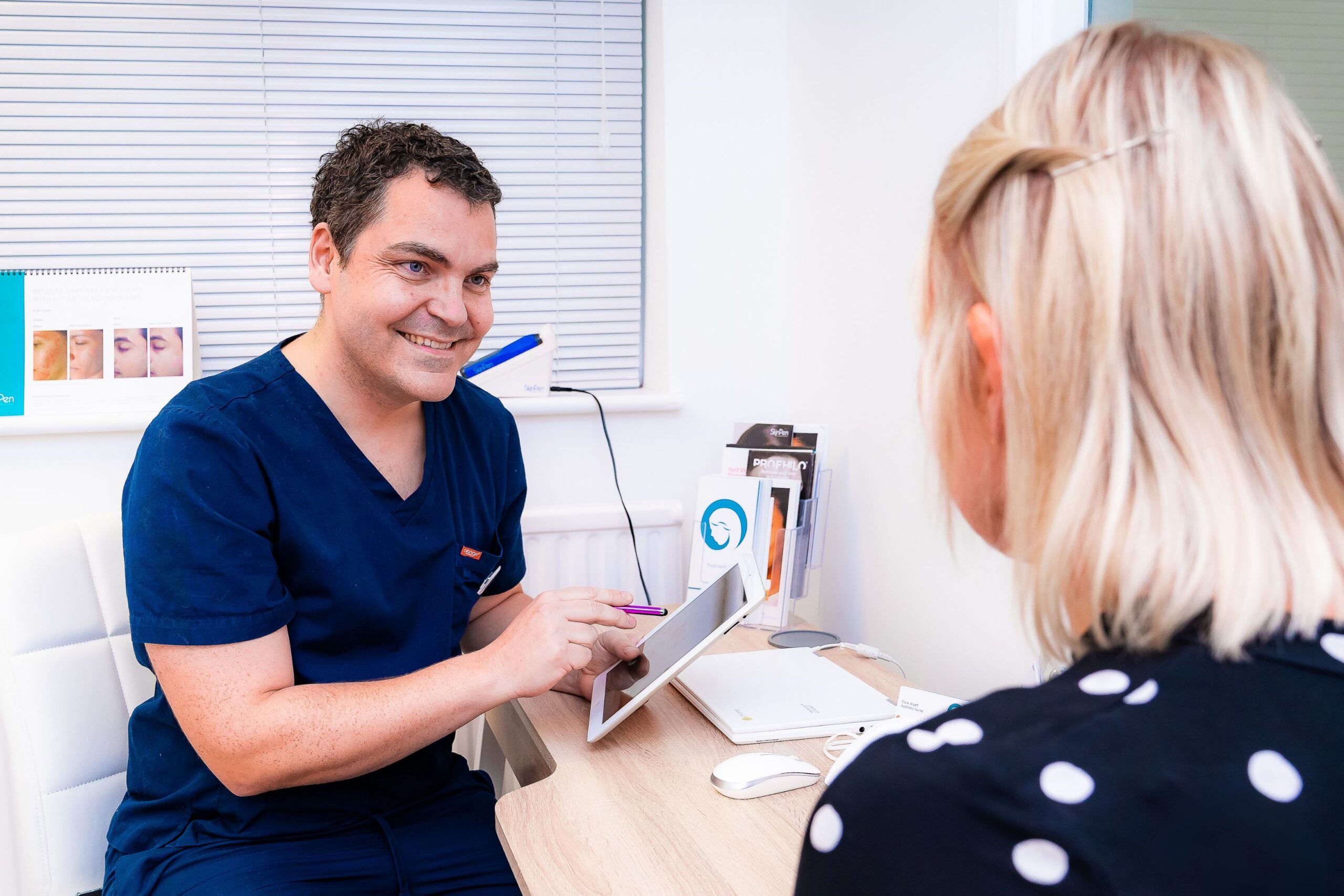
Book your consultation today to discuss your hormonal acne and receive a personalised treatment plan. You can book online by clicking here or contact us directly:
☎️ 01978 799688


